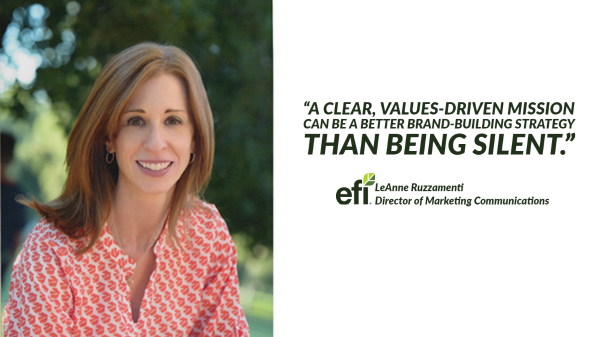While 2020 has been a year of a pandemic, loss and frustration, it has also been an important year for growth and learning. Consumers are pushing for equity and social justice and are asking brands to speak out and stand up.
A recent survey outlines these broad culture shifts with nearly 60% of consumers saying they expect companies to take a stand on issues like racial discrimination and social justice. Consumers want to know that companies have values similar to their own and are willing to act (and buy) for change.
Some companies live their values openly and are vocal about their stance, knowing they might alienate some customers. These bold companies, in fact, are gaining fans, customers and consumer respect. For instance, Ben & Jerry’s was quick to post a “Silence is NOT an Option” message in response to the Black Lives Matter movement and events this summer. This message of action aligns with the company’s long-term position on a variety of social advocacy issues.
Other companies have embraced a complete mission-driven approach to their products and marketing strategies. For example, Patagonia has a highly public stance against politicians who deny climate change and the science supporting it. From tags sewn into its clothing, to product strategies for repurposing, to dollars invested in support of protecting public lands, all areas of business support its mission and values.
Whether consumers applaud or criticize Patagonia and Ben & Jerry’s for taking a stand, they have a clear values-driven mission that resonates with their core audience and wins them new fans. Their missions benefit their audience and greater communities at large while also allowing for profits.
It may feel daunting to take a stance for the fear of alienating customers, but it could be more damaging to do nothing. Many brands have proven that a clear, values-driven mission can be a better brand-building strategy than being silent. Remember: generic really means non-descript and you don’t want your brand labeled as either.
Change comes from brave individuals and organizational leadership that champions for it. Corporate social responsibility is more than checking a box; it is a process of continuous change and improvement and should come from a values-driven culture. It’s time to review our personal values and apply them when looking inward at our company’s culture as well as considering the types of brands and companies with whom we want to align.
Produce provides healthful benefits and is intimately tied to its growers – the real people behind it. What better opportunity do you have to link your values to your brand than to openly live your culture and stop hiding behind a non-descript message you believe will appease the masses?
Article Credit: producebluebook
